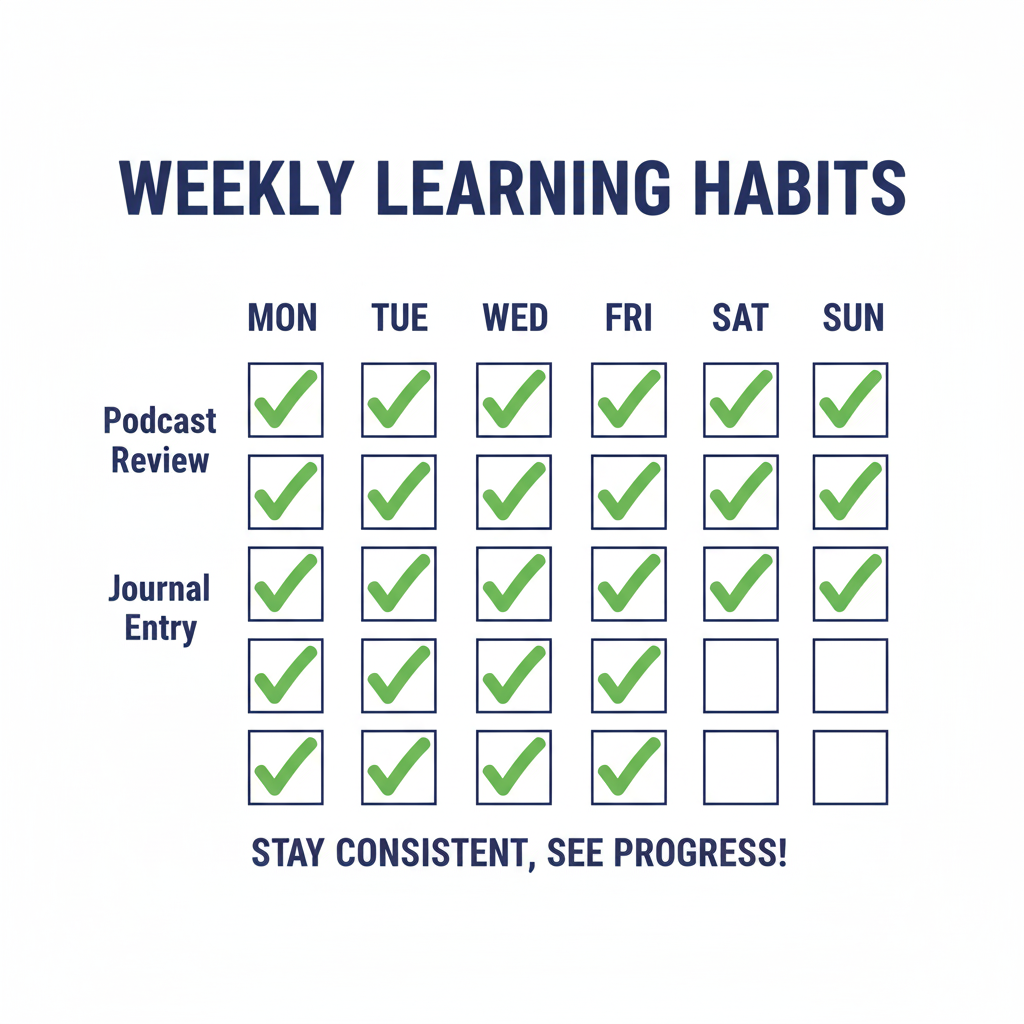Introduction: Why Daily Routines Beat Motivation
If you’ve ever tried to learn English with bursts of motivation, you know the pattern. You go hard for a week — long study sessions, ambitious goals — and then life happens. Work piles up. Your phone eats your attention. Suddenly, English slips back into the “someday” category.

That’s why English learning routines matter more than motivation. Motivation fades. Habits stick. When you fold English into your existing daily routine, you don’t rely on willpower anymore — you rely on momentum.
And mornings? They’re gold. Your brain is rested, distractions are low, and even a five-minute ritual can set the tone for your whole day. This article will show you why mornings work so well, give you practical rituals to try, and help you form habits you’ll actually keep.
Why Mornings Are a Secret Weapon
Habits Run on Autopilot
Think about how you brush your teeth. You don’t debate whether to do it. You don’t add it to your to-do list. You just do it. That’s the power of habit loops. If English slips into that same loop — like listening to a podcast while making coffee — it stops being a chore.
Fresh Brain, Fewer Excuses
By evening, you’re exhausted. Work, study, traffic, people… all drain your focus. But in the morning, you’ve got a clean slate. That’s why a quick English ritual before the chaos hits is easier to maintain.
Researchers at University College London found that repetition, not intensity, is what locks a habit in place (UCL study summary).
7 Morning Rituals That Actually Work

1. A Quick Podcast While You Brush
Put on a five-minute English podcast as you brush your teeth or get dressed. Zero extra time needed. A handy list of options? Check this guide to top podcasts.
2. Read One Short Article
Scroll through a short blog post, a news snippet, or even an Instagram caption in English. If grammar is on your radar, try this piece on the simple present tense.
3. Write Three Sentences About Your Day
No essays, no pressure. Just jot down three lines in English: what you’ll do today, how you feel, or even what you had for breakfast. This language journal guide shows how to make it a long-term habit.
4. Ten Words, No More
Pick ten words — review them on flashcards, or just glance at yesterday’s list. If you want to sound more natural, focus on English collocations instead of random single words.
5. Shadow a Line
Hear a sentence in a podcast or video? Repeat it out loud, copying tone and rhythm. That’s “shadowing,” and it’s powerful. This 21-day shadowing technique explains how.
6. Bite-Size Grammar Check
Take two minutes to revisit one rule. For example, practice reported speech using this guide. A little daily grammar adds up more than cramming ever will.
7. One Idiom a Day
Idioms make you sound more natural, and they’re fun. Add one to your morning ritual from this list of lesser-known idioms.
How to Build Habits You’ll Keep

Keep It Ridiculously Small
Starting tiny is better than going big and burning out. Two minutes is enough. Once the ritual sticks, it grows naturally.
Track It Visibly
Humans love progress bars. Use a habit tracker app or a calendar. Tick the box every morning — it’s weirdly motivating.
Tie It to Something You Already Do
Habit science calls this “anchoring.” Examples:
- Coffee + podcast
- Breakfast + journaling
- Train ride + vocabulary review
Focus on Consistency, Not Intensity
Daily five-minute actions beat weekend two-hour marathons. Remember: small habits create big results over time.
If you’re worried about getting stuck, here’s a guide on escaping the intermediate plateau.
Conclusion: Pick Just One and Try Tomorrow
Morning rituals don’t need to be complicated. They’re not about squeezing hours of study into your day. They’re about consistency. A short podcast, a few lines in a journal, or a single idiom learned at breakfast — all of these are enough to move you forward.
So don’t overthink it. Choose one ritual from this list, try it tomorrow, and see how it feels. Then drop a comment to share what worked for you — or pass this post to a friend who’s also chasing English fluency.
